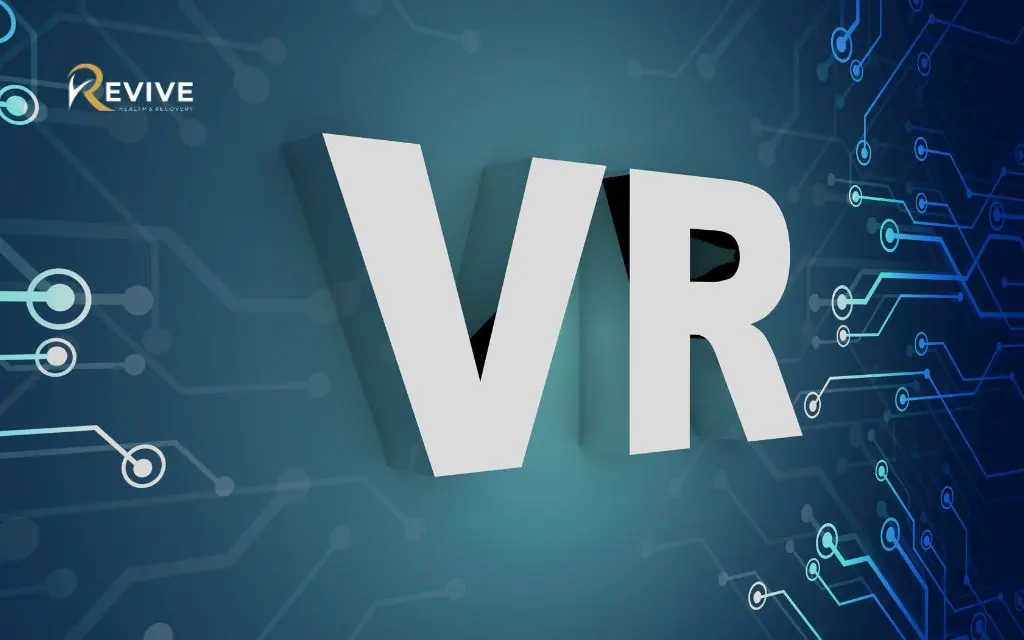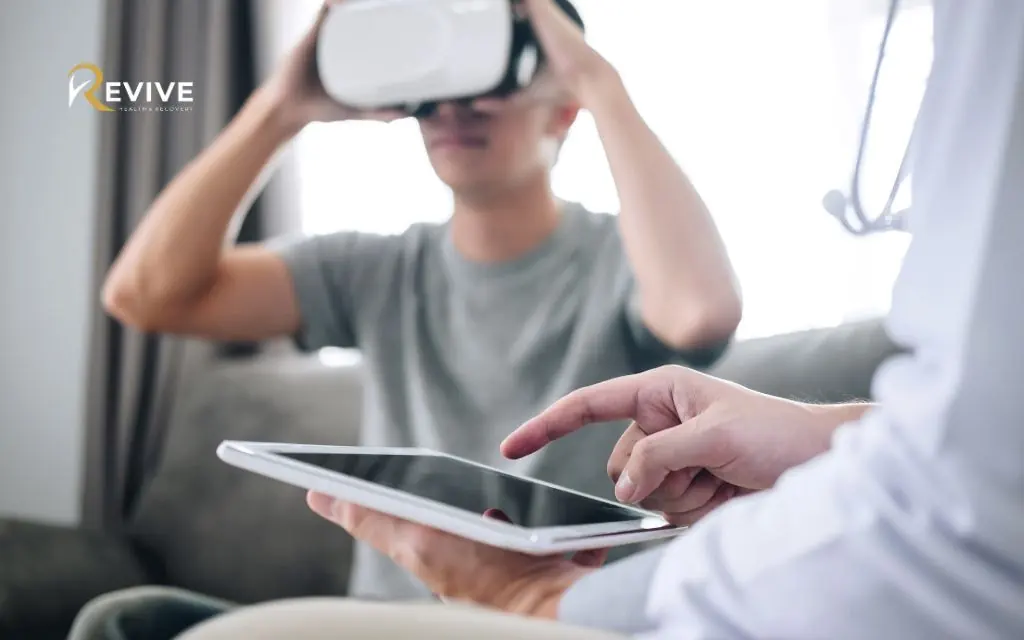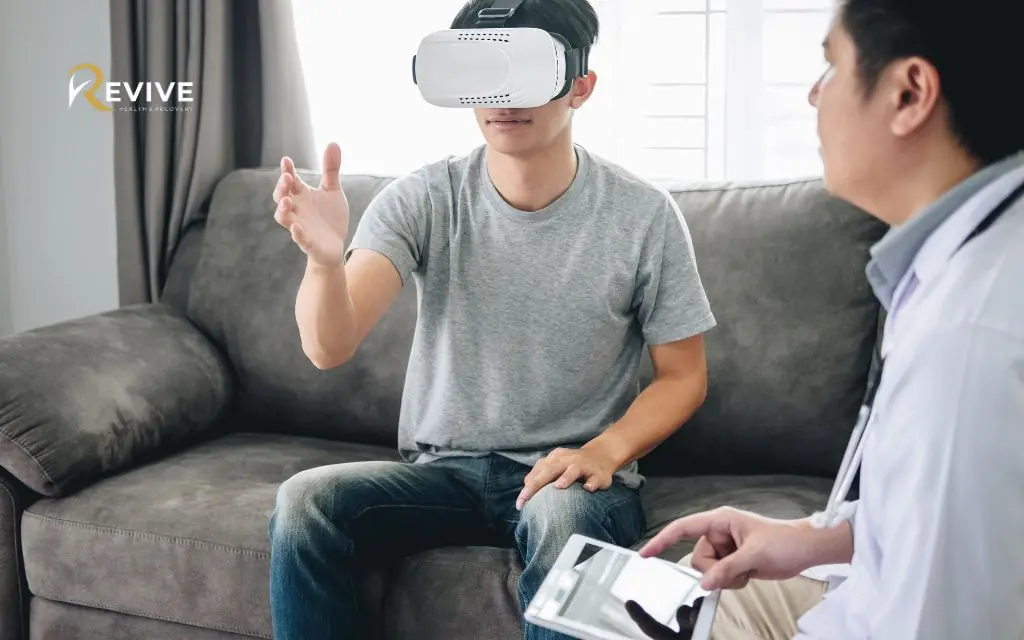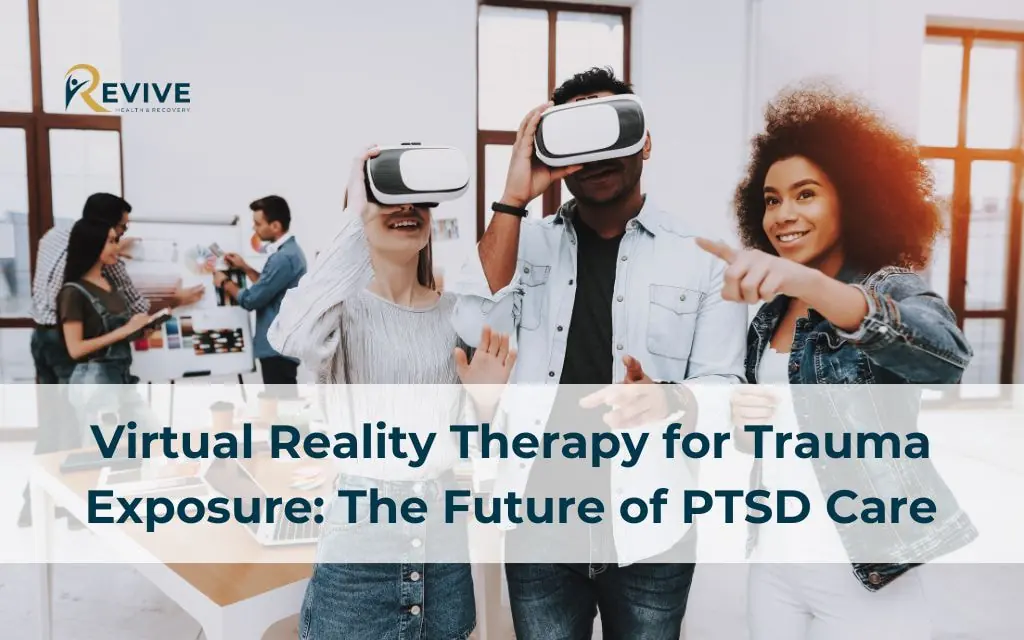Imagine harnessing the power of technology to rewire how we heal from trauma – a possibility that’s no longer science fiction but a reality unfolding today. Virtual reality therapy for trauma exposure is emerging as a groundbreaking tool, blending immersive digital experiences with proven therapeutic techniques to help individuals confront and overcome their deepest wounds. This innovative approach is gaining traction worldwide, and for residents of Denver, Colorado, it’s closer than ever.
In this article, we’ll explore how virtual reality therapy can transform trauma recovery and whether it’s the right fit for you or your loved ones. At Revive Health Recovery, a trusted local provider, this cutting-edge service is available to guide you on your healing journey. With Trauma Recovery Insights woven throughout, we’ll help you understand what this therapy offers and how it’s reshaping lives right here in Denver.
What Is Virtual Reality Therapy for Trauma Exposure?
Virtual Reality Therapy (VRT) represents a breakthrough in trauma treatment, combining technology with established therapeutic principles. Unlike traditional therapy that relies solely on conversation or imagination, VRT creates immersive digital environments where patients can safely confront traumatic memories under professional guidance.
At its core, VRT utilizes exposure therapy techniques – a method proven effective for treating trauma by gradually confronting difficult memories or situations, as supported by research from the U.S. Department of Veterans Affairs. The technology, often delivered through platforms like Oculus VR headsets, allows therapists to create controlled simulations that patients can navigate with professional support.
“Virtual reality therapy for trauma exposure offers a controlled environment where patients can process traumatic memories at their own pace, with the safety of knowing they can remove the headset at any time,” explains the clinical team at Revive Health Recovery in Denver.
This also makes it an ideal approach for trauma treatment for natural disaster survivors, where simulations can recreate disaster-related triggers in a controlled setting

This evidence-based approach leverages the power of immersion to help the brain reprocess traumatic experiences, potentially accelerating healing compared to traditional methods alone.
The Future of Mental Health: Digital Therapeutics & VR
The integration of virtual reality into trauma treatment represents just the beginning of a broader transformation in mental healthcare through digital therapeutics.
Research from Stanford University’s Virtual Human Interaction Lab continues to demonstrate how immersive technology can create lasting psychological and behavioral changes. As the technology evolves, treatment possibilities expand—from more realistic environments to incorporating biofeedback for enhanced personalization, a trend explored further in this Psychology Today article.
Revive Health Recovery maintains connections with research institutions to incorporate emerging best practices into their Denver-based programs. This commitment ensures clients receive treatment informed by the latest advancements while maintaining the human connection essential to healing.
Beyond individual therapy, VR technology shows promise in supporting community healing past wounds. Revive Health Recovery participates in community education initiatives to reduce stigma around trauma treatment and increase awareness of innovative options.
For those interested in complementary cutting-edge approaches, neurofeedback for trauma recovery offers another innovative way to support healing by training the brain to regulate itself.
How Does Virtual Reality Therapy Work?
A typical VRT session begins with a thorough assessment of the patient’s trauma history and triggers. The therapist then creates a personalized treatment plan, carefully selecting or designing digital environments that will help address specific aspects of the trauma.
During sessions, patients wear a VR headset, such as those developed by Oculus, while remaining in the therapist’s office. The therapist maintains verbal communication throughout, monitoring responses and providing guidance. Importantly, patients retain complete control – they can remove the headset or request modifications at any time.
“What makes VR therapy unique is our ability to customize simulations precisely to each patient’s trauma history, allowing for targeted exposure that’s both effective and manageable,” notes the clinical director at Revive Health Recovery.

Dr. Skip Rizzo, a pioneer in VR therapy for PTSD, explains: “Virtual reality creates a middle ground where patients can engage with traumatic memories in a way that feels real enough to be therapeutic but remains within their control.”
Sessions typically follow a progression from less to more challenging scenarios, with patients developing coping strategies and resilience along the way.
5 Benefits of Virtual Reality Therapy for Trauma
Research consistently demonstrates several key advantages of virtual reality therapy for trauma exposure:
- Neurological Rewiring: The immersive nature of VR promotes neuroplasticity—the brain’s ability to form new neural pathways, a concept further detailed by the American Psychological Association. This helps patients process traumatic memories without triggering the full stress response.
- Enhanced Engagement: Traditional therapy sometimes struggles with patient avoidance. VR therapy shows higher engagement rates, with patients more willing to continue treatment compared to conventional approaches.
- Precise Control: Therapists can adjust exposure levels with remarkable precision, creating ideal conditions for gradual desensitization.
- Measurable Progress: VR systems can track physiological responses like heart rate and skin conductance, providing objective data about treatment effectiveness.
- Accelerated Results: A study from Stanford University’s Virtual Human Interaction Lab found that some patients experienced significant symptom reduction in fewer sessions than traditional exposure therapy alone.
For individuals with PTSD, anxiety disorders, or complex trauma, these benefits translate to meaningful improvements in daily functioning and quality of life.
To explore specialized PTSD treatment options in Denver, Revive Health Recovery offers tailored programs to meet your needs.
If you’re seeking additional therapeutic approaches for complex trauma, you might also consider EMDR therapy as a proven method for processing and healing from traumatic experiences
Find Virtual Reality Therapy for Trauma in Denver
Denver’s mental health community has increasingly embraced innovative treatments, with virtual reality therapy emerging as a valuable option for trauma recovery. As Colorado continues to prioritize mental health services, specialized treatments like VR therapy have become more accessible.
Revive Health Recovery stands at the forefront of this movement in Denver, offering comprehensive trauma treatment that integrates virtual reality technology with evidence-based therapeutic approaches. Their team specializes in trauma-informed care that acknowledges each person’s unique experiences and recovery journey.
The investment in virtual reality therapy for trauma exposure varies based on several factors: Session Structure, Provider Qualifications, Program Integration. Many insurance providers now recognize VR therapy as a legitimate treatment option. Revive Health Recovery works with numerous insurance companies and offers insurance verification to determine coverage before beginning treatment.
For those with limited insurance coverage but want to know the cost of virtual reality therapy in denver, Revive Health Recovery provides payment plans and sliding scale options to make treatment accessible. When considering cost, it’s worth noting that effective trauma treatment often reduces long-term healthcare expenses associated with untreated trauma.
How to Start Virtual Reality Therapy for Trauma
Beginning VR therapy involves a straightforward process:
- Initial Consultation: Schedule a comprehensive assessment to discuss your trauma history, symptoms, treatment goals, and questions about the VR approach.
- Personalized Planning: Your therapist will develop a treatment plan specifying how VR therapy will integrate with other therapeutic approaches.
- Orientation Session: Before diving into trauma processing, you’ll have an orientation to the VR equipment and practice using it in neutral, non-triggering scenarios.
- Treatment Phase: Regular VR therapy sessions (typically weekly) will progressively address trauma content, with regular progress evaluations.
- Integration: Between sessions, you’ll practice applying insights and coping strategies to daily life.
“We emphasize creating a safe, judgment-free environment from the first phone call through the entire treatment journey,” explains the intake coordinator at Revive Health Recovery.
For those who may not be able to attend in-person sessions, online trauma therapy offers a convenient and effective alternative for accessing support remotely.

Across reviews of virtual reality therapy for trauma exposure, patients consistently mention several factors:
- The critical importance of the therapist-patient relationship even with technology involved
- Appreciation for the control VR provides compared to real-world exposure
- Initial skepticism followed by surprise at effectiveness
- Relief at finding an approach that works after previous treatment failures
To find a virtual reality therapist for trauma exposure in Denver, contact Revive Health Recovery at (303) 268-4655 or visit their website to schedule a confidential consultation.
Frequently Asked Questions
Is virtual reality therapy safe for people with severe trauma or PTSD?
Yes—sessions are guided by trained professionals to ensure safety and support. The therapist maintains constant communication and can immediately adjust or end the virtual experience if distress becomes unmanageable.
How long does virtual reality trauma therapy take to show results?
Many patients report reduced symptoms within 4–8 sessions, depending on the case. Research suggests VR therapy may produce results faster than traditional exposure therapy for some individuals, though healing timelines vary based on trauma severity and individual factors.
Can I combine VR therapy with medication or other treatments?
Absolutely. VR therapy is often integrated with CBT, DBT, or medication for a holistic approach. At Revive Health Recovery, treatment plans frequently combine complementary approaches for comprehensive care.
Is this therapy covered by insurance in Colorado?
Some providers and plans cover it—Revive Health Recovery can help verify your coverage. As VR therapy gains recognition for its effectiveness, more insurance companies are including it as a covered treatment.
How do I know if VR therapy is right for me or my loved one?
Start with a free consultation at Revive Health Recovery to discuss your needs and goals. Their clinical team can evaluate whether VR therapy matches your specific situation and explain how the benefits might apply to your unique circumstances.
Why Choose Revive Health Recovery for VR Therapy?
Revive Health Recovery distinguishes itself through several key factors:
Integrated Treatment Approach: VR therapy doesn’t exist in isolation but forms part of a comprehensive treatment program that may include cognitive behavioral therapy, mindfulness training, and when appropriate, coordination with medication management.
Trauma-Specific Expertise: The clinical team specializes in trauma treatment, bringing deep knowledge of both traditional and innovative approaches to healing.
State-of-the-Art Technology: Using the latest Oculus VR systems with specialized therapeutic software developed for trauma treatment.
Flexible Programming: Options include intensive outpatient programs, continuing care, and family involvement to support sustainable recovery. For those in high-stress professions, first responder trauma programs offer specialized care tailored to their unique experiences.
A former patient shares: “I’d tried talk therapy for years after my accident, but the flashbacks continued. The VR sessions at Revive helped me process what happened in a completely different way. I finally feel like I’m moving forward.”
Transform Your Recovery Journey with Virtual Reality Therapy
Virtual reality therapy represents a powerful approach to trauma recovery, combining technological innovation with proven therapeutic principles. For Denver residents seeking Colorado trauma recovery help, this treatment offers a path forward that many traditional approaches cannot provide.
The immersive technology, coupled with professional guidance at Revive Health Recovery, creates opportunities for healing that were previously unimaginable. By engaging with traumatic memories in a controlled, gradual manner, patients can process their experiences without becoming overwhelmed.
If you or someone you love struggles with trauma, consider exploring how virtual reality therapy might support your recovery journey. Contact Revive Health Recovery at (303) 268-4655 to learn more about their trauma treatment programs and how virtual reality therapy might benefit your specific situation.
Your path to healing deserves every advantage modern treatment can provide.



